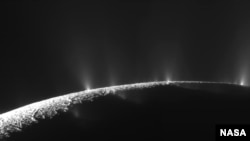Scientists' hunch that there is liquid water on one of Saturn's moons proved to be right.
Water is a key ingredient of life, so California Institute of Technology researchers say Saturn's moon Enceladus may be a good place to search for non-Earth life forms. This moon is just about 500 kilometers across.
Scientists thought Enceladus might have water since 2005, when NASA's Cassini spacecraft took pictures of eruptions of ice crystals from the moon's South Pole.
With complex measurements of the little moon's gravity, scientists were able to determine that there is a body of water, perhaps as large as North America's Lake Superior, underneath a thick ice sheet and above the moon's rocky core.
Researchers say the lake may be about 10 kilometers deep.
The discovery, published in the journal Science, makes Enceladus more attractive for future missions aimed at collecting samples from icy geysers.
Water is a key ingredient of life, so California Institute of Technology researchers say Saturn's moon Enceladus may be a good place to search for non-Earth life forms. This moon is just about 500 kilometers across.
Scientists thought Enceladus might have water since 2005, when NASA's Cassini spacecraft took pictures of eruptions of ice crystals from the moon's South Pole.
With complex measurements of the little moon's gravity, scientists were able to determine that there is a body of water, perhaps as large as North America's Lake Superior, underneath a thick ice sheet and above the moon's rocky core.
Researchers say the lake may be about 10 kilometers deep.
The discovery, published in the journal Science, makes Enceladus more attractive for future missions aimed at collecting samples from icy geysers.





